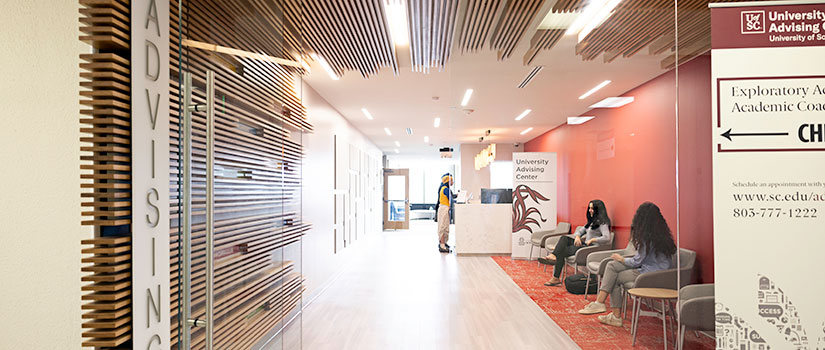For a student preparing to transfer schools, three pressing questions tend to emerge: How are my credits going to transfer? How long is it going to take me to graduate? And how much will all this cost?
The University Advising Center has been a leader in coordinating efforts across the state of South Carolina to make the transfer experience as smooth as possible, providing transparency and clear answers to student concerns. Amanda Lucas Shores, director of transfer student academic success, retention and advising, is one of the key players in shaping outcomes for transfer students at USC.
One of Shores’ top priorities has been designing direct transfer tracks with Midlands Technical College and Greenville Technical College. Of more than 250 colleges supplying transfer students to the University of South Carolina, Midlands Tech provides the most by far.
The UAC spent a year mapping out course-by-course plans for the ten particularly popular majors that students can complete at Midlands or Greenville Tech, allowing them to enter USC with two full years of degree-applicable, transferrable credits already under their belts. The tracks have already expanded to include 22 majors.
“We’re able to show some really coordinated, collaborative success in the approach we’re taking through these direct transfer tracks,” says Claire Robinson, assistant provost of undergraduate advisement. “Without these initiatives, transferring can be so confusing and unclear. By partnering with Admissions and Academic Programs while working with the colleges towards smoothing out the curriculum, we’re enabling transfer students to move through the channels so they know up front about their major choice and degree-applicable credits.”
The UAC is committed to ongoing review and growth of the program. In May 2024, over 100 faculty, staff, and administrators from both USC and Midlands Tech gathered to talk through the challenges, barriers and gaps to a smooth transfer process – with the ultimate goal of decreasing the rate of transfer students who do not graduate. Direct transfer pathways are being refined continually, but the results thus far have been promising for transfer students.
While the direct transfer tracks represent the university’s commitment to improving transfer student outcomes, they are just one of several initiatives aimed at building more robust student support. Shores also helped establish articulation agreements with the state technical college system, guaranteeing that any student taking classes at a South Carolina technical college can transfer into USC with up to 30 credit hours of degree-applicable coursework.
Underlying the success of the direct transfer and articulation agreements are initiatives such as the hiring of dedicated transfer advisors, which has allowed the UAC to build additional capacity for transfer students into their advising infrastructure. The Transfer Student Advisory Council is another key element in the success of the program.
Chaired by Shores, the Transfer Student Advisory Council is composed of representatives from 15 different offices across campuses, allowing a coordinated approach to transfer student success through intentional communication between transfer-related staff across campus.
“We pride ourselves on being a proactive committee, so we are looking at policy to make recommendations,” Shores says. “We are a very active group in creating change around the transfer student experience.”
As the first cohort of direct transfer students completes its first academic year at Carolina, the UAC is focused on evaluating opportunities to provide not just clear academic pathways but robust community support.
University 102 is an early effort piloted this year and modeled on the premise of University 101, providing transfer students with a one-credit course designed to introduce them to USC’s history, resources, and student support services.
“The intent is recognizing that transfer students aren’t new to college, but they are new to the University of South Carolina,” Shores says. “University 102 also provided an opportunity for transfer students to find friend groups, feel connected to the institution and share some of the challenges that they’re experiencing.”
On top of current transfer initiatives, Lara Lomicka Anderson’s recent appointment as permanent vice provost of undergraduate studies and dean of undergraduate education will provide support for the University Advising Center as Shores and Robinson navigate further enhancements to transfer efforts.
“The University Advising Center is a national leader in advising efforts, and I’m proud of the incredible dedication the UAC team shows in addressing not only challenges faced by transfer students but the outcomes of our undergraduate student as a whole,” Anderson says. “I’m pleased to work alongside Claire, Amanda and their team as they continue to refine and develop opportunities to build a thriving transfer experience at the University of South Carolina.”
